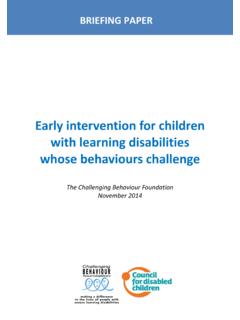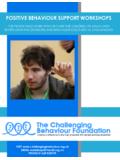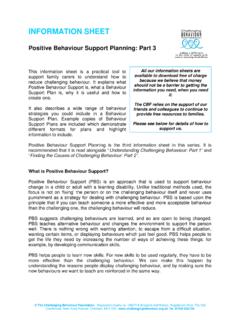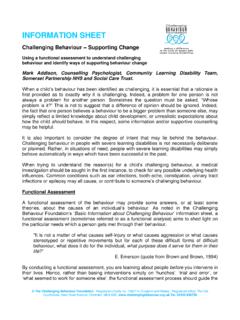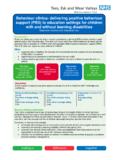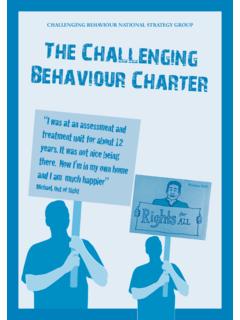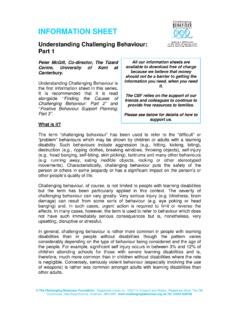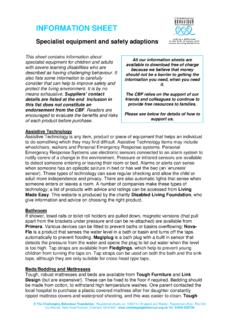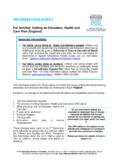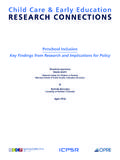Transcription of Psychiatric disorders in people with learning disability
1 The Challenging Behaviour Foundation. Registered charity no. 1060714 (England and Wales). Registered office: The Old Courthouse, New Road Avenue, Chatham, ME4 6BE. 01634 838739 In the general population it has been estimated that there are more people in hospital for mental health problems than for all other diseases combined. Mental health problems place enormous burdens on carers, social and medical services. They reduce the person s quality of life and their ability to cope. people with learning disabilities are just as likely to have mental health problems as the rest of society, with a lot of research suggesting that they are in fact more likely to suffer from a mental health condition.
2 Yet their problems usually go unnoticed because the symptoms can be lost amongst other behaviours which they may display. It is essential to be aware of potential mental health problems, and to get them assessed and treated without delay. What is a mental illness? The NHS defines mental illness as a condition that significantly interferes with an individual's cognitive, emotional or social abilities depression, anxiety, schizophrenia. The symptoms of mental illnesses usually follow a specific pattern but this can be difficult to spot if you re not sure what to look for.
3 Being clear on what the symptoms are and noticing these patterns in behaviour can help doctors make a diagnosis. Is there a link between mental health problems and challenging behaviour? Mental illness can lead to changes in a person s behaviour or possibly cause an increase in challenging behaviour. Research has found that when challenging behaviour becomes more severe it can be connected to an increase in the symptoms of a mental health problem. It has even been suggested that challenging behaviour can sometimes be another symptom of depression. Although, it s important to remember that other factors can cause challenging behaviour and for more information please see our information sheet: Understanding Challenging Behaviour.
4 There are three main ideas around the link between challenging behaviour and mental illness: Primary: where the behaviour is a direct result of the mental illness, Jon uses aggression in response to hearing voices INFORMATION SHEET Mental health problems in people with learning disabilities All our information sheets are available to download free of charge because we believe that money should not be a barrier to getting the information you need, when you need it. The CBF relies on the support of our friends and colleagues to continue to provide free resources to families.
5 Please see below for details of how to support us. 2 The Challenging Behaviour Foundation. Registered charity no. 1060714 (England and Wales). Registered office: The Old Courthouse, New Road Avenue, Chatham, ME4 6BE. 01634 838739 Secondary: where a behavioural response to a symptom of the illness creates challenging behaviour, Greg screams in response to a flashback, Tony, his carer, responds negatively and Greg then uses aggression against Tony Consequential: where the behaviour begins as in primary but is reinforced by others and becomes learned behaviour, Shaun had become aggressive as part of his mental illness, and noticed that he got a lot more attention when he did so.
6 Despite the medication helping his mental illness, he continued to use aggression as a way of attracting the attention he needed from others. Is challenging behaviour itself a mental health problem? Behaviours are described as challenging mainly because they break social rules, that it is wrong to hurt others, hurt one s self, destroy property or otherwise disrupt other people s lives. There are many reasons why someone might display these kinds of behaviours. The fact that a person shows challenging behaviour does not mean that they have a mental health problem.
7 This is probably true for most individuals with a learning disability . However, some people do have both types of problem. When a person has mental health problems and displays challenging behaviour, the picture becomes very complicated. It is often difficult to know whether the challenging behaviour is happening partly because of the mental health problem, or whether the challenging behaviour has completely different causes, maybe relating to problems in the person s home or school for example. Can having a learning disability affect the development of a mental health problem?
8 A wide range of factors influence a person s mental health. Mental health is closely related to the quality of a person s physical and social environment. Having good social supports, respect within society and an interesting and stimulating environment are all factors which can help protect our mental health. If we do not have these strong supports we are more vulnerable to mental health problems. In addition, the level of learning disability can be an important factor when assessing the individual s mental health needs. In people with severe or profound learning disabilities, mental health problems are likely to relate to complex brain, nervous system, genetic and other biological abnormalities.
9 people with mild or moderate learning disabilities are more likely to be affected by social risk factors like parental rejection, long-term institutionalisation, poor social networks, lack of self-esteem etc. It is also important to remember that many people with learning disabilities, even if they have a good quality of life now, may continue to suffer from the effects of their past life. Long periods in an institution and/or early parental rejection may affect the rest of the person s life. 3 The Challenging Behaviour Foundation. Registered charity no.
10 1060714 (England and Wales). Registered office: The Old Courthouse, New Road Avenue, Chatham, ME4 6BE. 01634 838739 What are some examples of common mental health problems? NB. Giving medication to people with severe learning disabilities should only be done under the supervision of an experienced professional. See the CBF s information sheet on Use of Medication for further information & advice. What is it? Why? Treatment Further Info* Depression In the general population, depression is the most common mental health problem in adults, occurring in about 13% of all people at some time in their lives.
